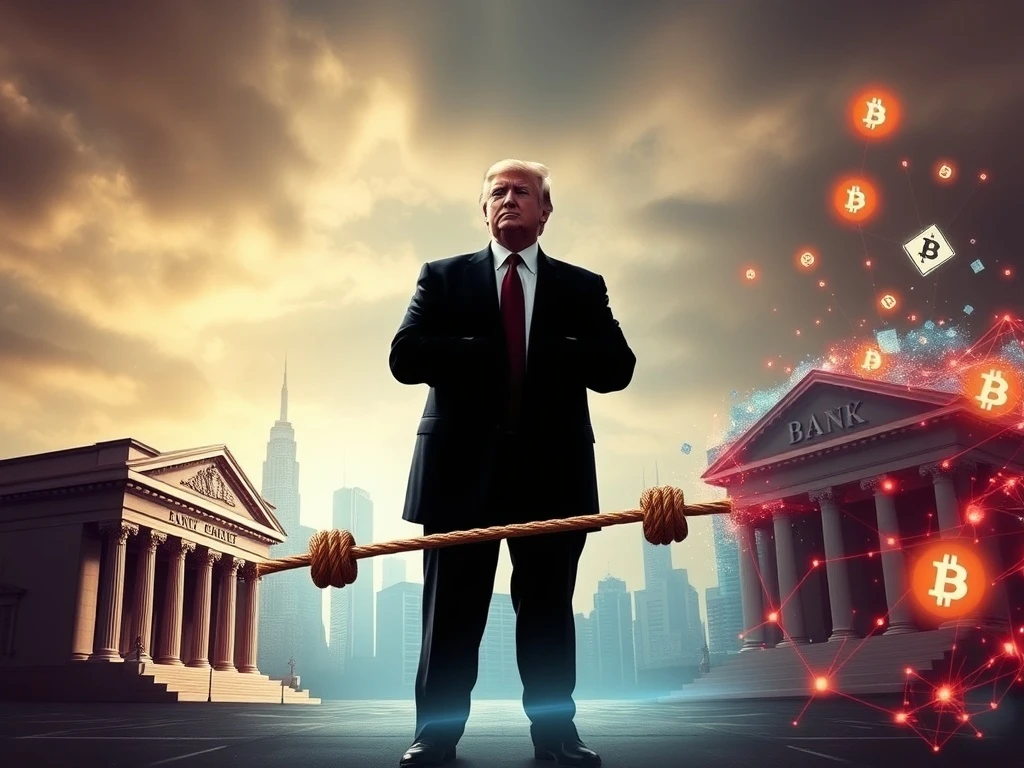Empowering Innovation: Fintech Crypto Groups Urge Trump to Defend Crucial Open Banking Rules

Are you ready for a financial revolution? The digital age is transforming how we manage our money, and at the heart of this change lies a fierce battle over Open Banking Rules. A powerful coalition of fintech, crypto, and consumer advocacy groups is making a direct appeal to Donald Trump, urging him to champion these vital regulations against significant pushback from established U.S. banks. This isn’t just about convenience; it’s about who controls your financial information and the very future of innovation in the digital economy.
The Pivotal Clash Over Open Banking Rules
The core of this unfolding drama revolves around a set of Open Banking Rules finalized in 2024. These regulations are designed to empower consumers, giving them the right to securely share their financial data across various platforms using secure Application Programming Interfaces (APIs). For the crypto world, this framework is nothing short of foundational. It’s the plumbing that allows seamless crypto on-ramps, stablecoin integration, and the flourishing of decentralized finance (DeFi) ecosystems. Imagine effortlessly connecting your bank account to your favorite crypto exchange or DeFi protocol – that’s the promise of open banking.
However, this vision faces stiff resistance. The Bank Policy Institute, a formidable trade group representing banking giants like JPMorgan Chase and Bank of America, wasted no time. Immediately after the rules were enacted, they filed a lawsuit, citing concerns over security risks and what they claim are unfair burdens on traditional institutions. Simultaneously, some major banks, including JPMorgan, have begun imposing fees on fintech and crypto firms for accessing customer account data, with charges escalating for payment-related services. This dual approach – legal challenges combined with financial barriers – creates a challenging environment for innovation.
The coalition, which includes prominent organizations like the Blockchain Association and the Financial Technology Association, argues that these actions by banks are directly undermining innovation. In their recent letter to Trump, they emphasized a critical principle: financial data ownership should unequivocally rest with the consumer. They view robust open banking as indispensable for maintaining U.S. financial leadership on the global stage.
Why Are Fintech Crypto Groups Pushing So Hard?
The synergy between Fintech Crypto and open banking is undeniable. For the burgeoning digital asset space, open banking isn’t just a nice-to-have; it’s a fundamental enabler. Here’s why:
- Seamless On-Ramps: Open banking simplifies the process of moving funds from traditional bank accounts into crypto exchanges and wallets, making digital assets more accessible to everyday users.
- DeFi Integration: Decentralized finance protocols often rely on secure data sharing to verify user solvency or provide tailored financial products, which open banking APIs can facilitate without revealing sensitive personal details.
- Stablecoin Utility: For stablecoins, which often bridge the gap between traditional fiat and digital assets, open banking can streamline redemption and issuance processes, enhancing their utility and liquidity.
- Innovation and Competition: By lowering barriers to data access, open banking fosters a more competitive landscape, allowing smaller fintech and crypto startups to develop innovative services that challenge established financial institutions.
The coalition’s plea to the Trump administration is clear: intervene in the ongoing litigation by July 29th. They advocate for a court ruling that solidifies consumer ownership of financial data and ensures unrestricted sharing. The stakes are high; the outcome will directly impact how easily Americans can connect their bank accounts to crypto exchanges, stablecoin wallets, and various payment applications.
Trump’s Crypto Stance: A Defining Moment?
President Donald Trump has positioned himself as a vocal supporter of the crypto industry, explicitly stating his commitment to fostering its growth within the U.S. This stance makes the current open banking debate a particularly interesting test for his administration. On one hand, defending open banking aligns with a pro-innovation, pro-consumer agenda that could further solidify his appeal to the crypto community.
However, the pressure from traditional banks, powerful lobbyists, and their arguments about systemic risks (especially in the absence of a comprehensive crypto regulatory framework) present a formidable counterforce. Critics of open banking argue that these rules could create vulnerabilities by allowing unregulated third-party access to sensitive data. This perspective often plays into the broader narrative of caution around crypto, particularly given the U.S.’s ongoing efforts to establish clear digital asset regulations.
The coalition’s letter serves as a crucial reminder that a stated commitment to crypto leadership requires consistent enforcement of policies that genuinely promote innovation. The resolution of this conflict will likely determine whether the U.S. maintains its competitive edge in digital finance or risks ceding ground to global peers like the UK and EU, where open banking frameworks are already well-established and thriving.
The Battle for Financial Data Ownership
At its core, this dispute is a battle for Financial Data ownership. Should banks control access to your transactional history, or should you, the consumer, have the ultimate say? The fintech and crypto groups firmly believe that consumers are the rightful owners of their data. This principle underpins the entire open banking movement globally.
The irony is not lost on observers: while major banks resist open banking, they are simultaneously expanding their own crypto initiatives. JPMorgan, for instance, recently applied to trademark “JPMD,” a blockchain-based stablecoin aimed at institutional settlements. Mastercard and ten U.S. banks also participated in a tokenization pilot for instant settlements. This dual approach – opposing broad open banking while investing in specific crypto infrastructure – highlights a strategic tension. Fintech and crypto advocates see this as banks attempting to control the innovation narrative, erecting regulatory barriers for others while capitalizing on crypto’s growth themselves.
Securing US Financial Leadership in a Digital World
The outcome of this open banking dispute has profound implications for US Financial Leadership. The U.S. has long been a global financial powerhouse, and its ability to adapt and lead in the digital finance era is critical. A robust open banking framework is not merely a technical detail; it’s a strategic imperative that:
- Fosters a Dynamic Ecosystem: It allows for the emergence of new services and business models, attracting talent and investment.
- Enhances Consumer Choice: It breaks down silos, giving consumers more options and better control over their financial lives.
- Promotes Global Competitiveness: Countries with advanced open banking frameworks are better positioned to attract fintech innovation and integrate into the global digital economy.
- Drives Efficiency: Secure data sharing can lead to more efficient financial processes, lower costs, and faster transactions for businesses and consumers alike.
If the U.S. falters in establishing a clear and pro-innovation open banking environment, it risks falling behind nations that have already embraced these principles. The debate isn’t just about banks versus fintech; it’s about the future trajectory of American economic prowess in a rapidly digitizing world.
The Road Ahead: What to Watch For
The coming weeks will be critical. All eyes will be on the Trump administration’s response to the coalition’s appeal and the ongoing legal battles. Will the administration lean into its stated support for crypto and innovation, or will the powerful lobbying efforts of traditional banks prevail? The decision will not only shape the regulatory landscape but also directly impact the accessibility and growth of crypto and fintech services for millions of Americans.
This conflict underscores a fundamental tension in modern finance: the desire for innovation and consumer empowerment clashing with the established order’s concerns over risk and control. How this tension is resolved will define the financial future for years to come.
Frequently Asked Questions (FAQs)
What are Open Banking Rules?
Open Banking Rules are regulations that allow consumers to securely share their financial data from their bank accounts with third-party applications and services, typically through secure APIs (Application Programming Interfaces). This gives consumers more control over their financial information and fosters competition and innovation in the financial sector.
Why are major banks opposing Open Banking?
Major banks, represented by groups like the Bank Policy Institute, oppose open banking due to concerns over security risks, the burden of compliance, and what they perceive as unfair competition from unregulated third-party fintech and crypto firms. They also argue about the costs associated with providing data access.
How do Open Banking Rules benefit crypto users?
For crypto users, open banking rules facilitate easier on-ramps and off-ramps between traditional bank accounts and crypto exchanges/wallets. They enable smoother integration with decentralized finance (DeFi) applications and stablecoin ecosystems, making it simpler and more secure to manage digital assets.
What is Trump’s role in this debate?
President Trump is being urged by fintech and crypto groups to intervene and defend open banking rules. As a vocal supporter of the crypto industry, his administration’s stance on this issue will be a key indicator of its commitment to fostering innovation versus supporting traditional financial institutions.
What is the significance of consumer ownership of financial data?
Consumer ownership of financial data means that individuals, not banks, have the ultimate right to decide who can access and use their financial information. This principle is central to open banking and aims to empower consumers, promote transparency, and enable a more personalized and competitive financial services market.









